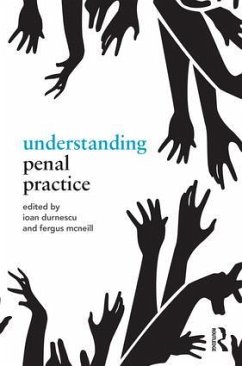Understanding Penal Practice
Herausgeber: Durnescu, Ioan; Mcneill, Fergus
Understanding Penal Practice
Herausgeber: Durnescu, Ioan; Mcneill, Fergus
- Broschiertes Buch
- Merkliste
- Auf die Merkliste
- Bewerten Bewerten
- Teilen
- Produkt teilen
- Produkterinnerung
- Produkterinnerung
This book brings together leading criminologists to explore internationally significant and cutting-edge theoretical and empirical work on the cultures, practices, roles and impacts of frontline practitioners in delivering penal sanctions.
Andere Kunden interessierten sich auch für
![Handbook of Probation Handbook of Probation]() Handbook of Probation88,99 €
Handbook of Probation88,99 €![Arts in Corrections Arts in Corrections]() Grady Hillman (Poet, literary translator, folklorist, and essayist.Arts in Corrections149,99 €
Grady Hillman (Poet, literary translator, folklorist, and essayist.Arts in Corrections149,99 €![Arts in Corrections Arts in Corrections]() Grady HillmanArts in Corrections36,99 €
Grady HillmanArts in Corrections36,99 €![Desistance Transitions and the Impact of Probation Desistance Transitions and the Impact of Probation]() Sam King (UK University of Leicester)Desistance Transitions and the Impact of Probation35,99 €
Sam King (UK University of Leicester)Desistance Transitions and the Impact of Probation35,99 €![Justice, Crime, and Ethics Justice, Crime, and Ethics]() Michael C. Braswell (East Tennessee State Unive Professor EmeritusJustice, Crime, and Ethics105,99 €
Michael C. Braswell (East Tennessee State Unive Professor EmeritusJustice, Crime, and Ethics105,99 €![The Routledge Companion to Rehabilitative Work in Criminal Justice The Routledge Companion to Rehabilitative Work in Criminal Justice]() The Routledge Companion to Rehabilitative Work in Criminal Justice73,99 €
The Routledge Companion to Rehabilitative Work in Criminal Justice73,99 €![The Use of Force in Criminal Justice The Use of Force in Criminal Justice]() Richard M. HoughThe Use of Force in Criminal Justice61,99 €
Richard M. HoughThe Use of Force in Criminal Justice61,99 €-
-
-
This book brings together leading criminologists to explore internationally significant and cutting-edge theoretical and empirical work on the cultures, practices, roles and impacts of frontline practitioners in delivering penal sanctions.
Produktdetails
- Produktdetails
- Routledge Frontiers of Criminal Justice
- Verlag: Taylor & Francis Ltd
- Seitenzahl: 368
- Erscheinungstermin: 9. Juni 2015
- Englisch
- Abmessung: 234mm x 156mm x 20mm
- Gewicht: 554g
- ISBN-13: 9781138922419
- ISBN-10: 1138922412
- Artikelnr.: 42235930
- Herstellerkennzeichnung
- Libri GmbH
- Europaallee 1
- 36244 Bad Hersfeld
- gpsr@libri.de
- Routledge Frontiers of Criminal Justice
- Verlag: Taylor & Francis Ltd
- Seitenzahl: 368
- Erscheinungstermin: 9. Juni 2015
- Englisch
- Abmessung: 234mm x 156mm x 20mm
- Gewicht: 554g
- ISBN-13: 9781138922419
- ISBN-10: 1138922412
- Artikelnr.: 42235930
- Herstellerkennzeichnung
- Libri GmbH
- Europaallee 1
- 36244 Bad Hersfeld
- gpsr@libri.de
Ioan Durnescu is a Senior Lecturer at the University of Bucharest, Faculty of Sociology and Social Work. Ioan is also the founder and editor of the European Journal of Probation (www.ejprob.eu) and author or a number of books and articles published in Romania and abroad. Together with Professor Anton van Kalmthout he co-edited Probation in Europe. Before becoming an academic he worked for the Prison Department and Probation Department in Romania. Fergus McNeill is Professor of Criminology and Social Work at the University of Glasgow where he works in the Scottish Centre for Crime and Justice Research. Prior to becoming an academic in 1998, he worked in residential drug rehabilitation and as a criminal justice social worker.
Introduction Part 1: Understanding practice, understanding practitioners,
1. Professional ideologies in the United States' probation and parole 2.
Correctional officer training in Canada, 3. Who works in the probation
service in Romania, 4. Explaining French probation: social work in a prison
administration, 5. Probation practices and Übergangsmanagement in Germany:
state of play and challenges, 6.Volunteers in the probaiton service: a
comparison between Germany and Japan, 7. Redefining professionalism by
seeking legitimacy in probation? A comparison between Belgium and England
and Wales, 8. Understanding 'the relationship' in English probation
supervision, 9. What quality means to probation staff in England in
relation to one-to-one supervision, 10. Staff-prisoner relationships, moral
performance and privitization, 11. Changing lives, changing work: social
work and criminal justice, Part 2: Supporting practitioners, improving
practice 12. Staff skills and characteristics in probation history: a
literature review, 13. Co-producing desistance: who works to support
desistance? 14.Practicing the Good Lives Models (GLM), 15. Effective
supervision in youth justice: a comparison of data sources, Chris Trotter
16. Supporting probation officers' evidence-based professional development
in the strategic thinking initiative in community supervision (STICS):
Ongoing clinical support activities and the individuals who lead the
charge, 17. Supervision skills and practices: the Jersey study, 18.
Supporting practitioners to engage offenders, 19. Sources of professional
effectiveness, Anneke Menger and Andrea Donker 20. Wraparound care as a
booster of the crime reducing effects of probation, 21. Aligning the
purposes of probation with professional and learning competencies: basic
conditions for a new professionalism, Conclusion: changing penal practice.
1. Professional ideologies in the United States' probation and parole 2.
Correctional officer training in Canada, 3. Who works in the probation
service in Romania, 4. Explaining French probation: social work in a prison
administration, 5. Probation practices and Übergangsmanagement in Germany:
state of play and challenges, 6.Volunteers in the probaiton service: a
comparison between Germany and Japan, 7. Redefining professionalism by
seeking legitimacy in probation? A comparison between Belgium and England
and Wales, 8. Understanding 'the relationship' in English probation
supervision, 9. What quality means to probation staff in England in
relation to one-to-one supervision, 10. Staff-prisoner relationships, moral
performance and privitization, 11. Changing lives, changing work: social
work and criminal justice, Part 2: Supporting practitioners, improving
practice 12. Staff skills and characteristics in probation history: a
literature review, 13. Co-producing desistance: who works to support
desistance? 14.Practicing the Good Lives Models (GLM), 15. Effective
supervision in youth justice: a comparison of data sources, Chris Trotter
16. Supporting probation officers' evidence-based professional development
in the strategic thinking initiative in community supervision (STICS):
Ongoing clinical support activities and the individuals who lead the
charge, 17. Supervision skills and practices: the Jersey study, 18.
Supporting practitioners to engage offenders, 19. Sources of professional
effectiveness, Anneke Menger and Andrea Donker 20. Wraparound care as a
booster of the crime reducing effects of probation, 21. Aligning the
purposes of probation with professional and learning competencies: basic
conditions for a new professionalism, Conclusion: changing penal practice.
Introduction Part 1: Understanding practice, understanding practitioners,
1. Professional ideologies in the United States' probation and parole 2.
Correctional officer training in Canada, 3. Who works in the probation
service in Romania, 4. Explaining French probation: social work in a prison
administration, 5. Probation practices and Übergangsmanagement in Germany:
state of play and challenges, 6.Volunteers in the probaiton service: a
comparison between Germany and Japan, 7. Redefining professionalism by
seeking legitimacy in probation? A comparison between Belgium and England
and Wales, 8. Understanding 'the relationship' in English probation
supervision, 9. What quality means to probation staff in England in
relation to one-to-one supervision, 10. Staff-prisoner relationships, moral
performance and privitization, 11. Changing lives, changing work: social
work and criminal justice, Part 2: Supporting practitioners, improving
practice 12. Staff skills and characteristics in probation history: a
literature review, 13. Co-producing desistance: who works to support
desistance? 14.Practicing the Good Lives Models (GLM), 15. Effective
supervision in youth justice: a comparison of data sources, Chris Trotter
16. Supporting probation officers' evidence-based professional development
in the strategic thinking initiative in community supervision (STICS):
Ongoing clinical support activities and the individuals who lead the
charge, 17. Supervision skills and practices: the Jersey study, 18.
Supporting practitioners to engage offenders, 19. Sources of professional
effectiveness, Anneke Menger and Andrea Donker 20. Wraparound care as a
booster of the crime reducing effects of probation, 21. Aligning the
purposes of probation with professional and learning competencies: basic
conditions for a new professionalism, Conclusion: changing penal practice.
1. Professional ideologies in the United States' probation and parole 2.
Correctional officer training in Canada, 3. Who works in the probation
service in Romania, 4. Explaining French probation: social work in a prison
administration, 5. Probation practices and Übergangsmanagement in Germany:
state of play and challenges, 6.Volunteers in the probaiton service: a
comparison between Germany and Japan, 7. Redefining professionalism by
seeking legitimacy in probation? A comparison between Belgium and England
and Wales, 8. Understanding 'the relationship' in English probation
supervision, 9. What quality means to probation staff in England in
relation to one-to-one supervision, 10. Staff-prisoner relationships, moral
performance and privitization, 11. Changing lives, changing work: social
work and criminal justice, Part 2: Supporting practitioners, improving
practice 12. Staff skills and characteristics in probation history: a
literature review, 13. Co-producing desistance: who works to support
desistance? 14.Practicing the Good Lives Models (GLM), 15. Effective
supervision in youth justice: a comparison of data sources, Chris Trotter
16. Supporting probation officers' evidence-based professional development
in the strategic thinking initiative in community supervision (STICS):
Ongoing clinical support activities and the individuals who lead the
charge, 17. Supervision skills and practices: the Jersey study, 18.
Supporting practitioners to engage offenders, 19. Sources of professional
effectiveness, Anneke Menger and Andrea Donker 20. Wraparound care as a
booster of the crime reducing effects of probation, 21. Aligning the
purposes of probation with professional and learning competencies: basic
conditions for a new professionalism, Conclusion: changing penal practice.









